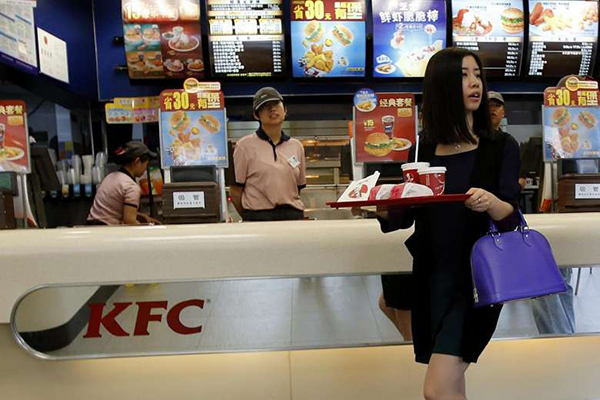 |
|
A woman carries a tray of food inside a KFC restaurant in Beijing. Yum Brands Inc, the parent company of KFC, has seen its China sales slide. [Photo/Agencies] |
Xiaobai Xiaobai goes downstairs to KFC,
Hamburger, ah, Hamburger
French fries, ah, French fries
Coke, ah, coke
...
I always feel very uneasy when I hear this nursery rhyme my four-year-old daughter learned from kindergarten about ordering food at KFC.
According to Chinese tradition, I am supposed to pay special respect to her teacher but I totally disagree with this rhyme that may brainwash my kid. KFC is the last choice for me.
So a conflict is inevitable whenever we pass by a KFC outlet. I have to try all means to persuade my little girl to change her idea. But she always wins the battle, as the threat of childhood obesity and stunted development is totally beyond her comprehension right now.
I can fully understand her 50-year-old teacher who taught the rhyme. She still has her first impression about KFC from the 1990s when it was the symbol of high quality and cleanliness.
As the early bird that entered China's fast-food market in 1987, KFC has enjoyed great success and big fame in the past three decades. It gained a reputation as offering a taste of the United States for Chinese people born in the 1960s and became an icon of China's opening up.
However, its golden era has ended due to health concerns, competitive strategies and increasing local rivals.
The first and most important concern is about health.
For me, eating KFC is sinful because weight loss is always a priority for me and other middle-class people who value a healthy lifestyle.
But KFC's fried chicken, French fries, hamburgers and soft drinks are globally well-known junk food. And more and more Chinese believe that fast food usually is high in calories, high in fat, high in sodium and low in nutrition.
Besides poor nutrition, repeated food safety scandals have damaged KFC's reputation for high quality.
Second, KFC's two key trump cards of novelty and customization can hardly satisfy the picky younger generation born after 1990.
I can still remember KFC was something exotic and prestigious back in 1999 when I was a sophomore. My friend and I ate the French fries one by one in a very reverential manner-it was more than fast food, it was like embracing a different lifestyle.
However, KFC lost the aura as average Chinese incomes increased from less than 50 cents a day in the 1980s to more than $50 right now. It has been relegated to the last choice, and is seen as the option for those working overtime or on busy business trips.
As its competitors gained strength, KFC opted increasingly for a localization strategy. It tried all means to please Chinese customers by introducing local elements such as soybean milk, deep-fried dough sticks and porridge.
But the problem is that it is weird for most Chinese people, who are obsessed with traditional flavors, to choose KFC instead of Yon Ho Food Co, which has deep roots in traditional Chinese culture.
KFC may have tasted good in the 1980s and the 1990s, but its consumers are totally different now.
Finally, China's fast-food market is now red hot, a totally different situation from the 1990s when good market players could simply take advantage of the fact that there was very little else for consumers to choose from.
Now I can easily find dozens of options around the neighborhood where I live, including Yunnan rice noodles, Canton Zheng Kungfu steamed buns and ramen from Lanzhou.
It is clear that the fast-food market is overcrowded as investors from home and abroad are all betting heavily on this huge market.
All of these factors jointly have contributed to KFC's sluggish performance in recent years.
And I was surprised to find that KFC could hardly be found the last time I visited UCLA and Georgetown University. It seems that KFC, even back in the US, is becoming an aging brand.
The new generation from China and the US are born global villagers who expect something cool and different, whether it is Jumba Juice, Qingfeng Baozi or Shaxia Delicacies.
None of Yum's options-KFC, Pizza Hut and Taco Bell-can meet such demand.
